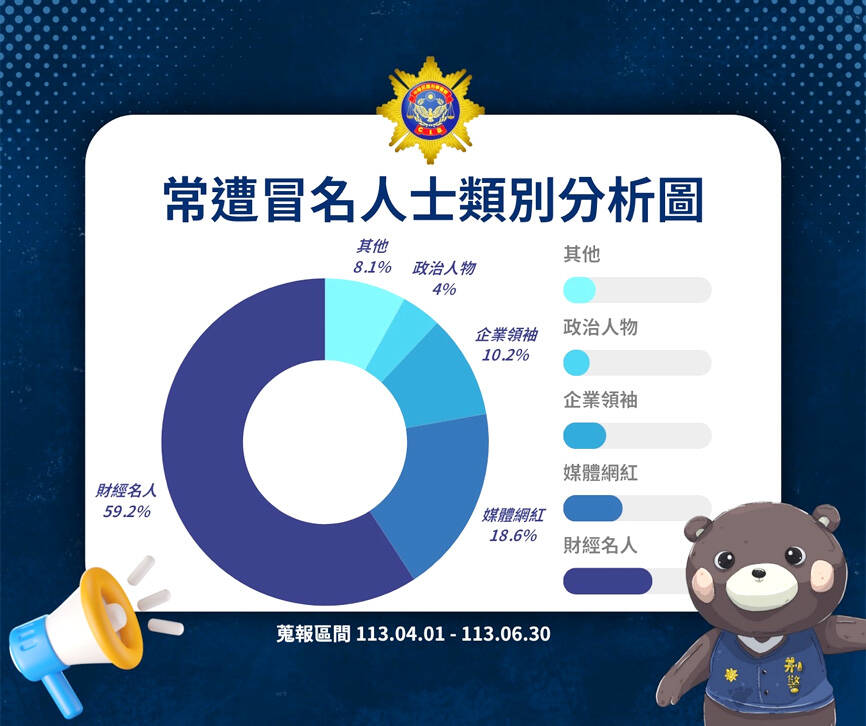Facebook parent Meta Platforms has removed more than 46,500 fraudulent advertisements from its services in the past three months, the Criminal Investigation Bureau (CIB) said on Sunday.
The bureau has been working with Meta and other technology firms such as Google to crack down on investment fraud and related scams.
In the second quarter, Meta took down more than 46,500 ads targeting people in Taiwan, while Google removed 1,466 ads determined to be fraudulent — 623 on YouTube and 843 on other Google platforms, the bureau said in a news release.

Photo courtesy of the Criminal Investigation Bureau
In the past few years, social media users in Taiwan have been targeted by numerous ads promising high returns on investments, schemes that are often affiliated with criminal organizations, CIB officials said.
Many of the ads feature celebrities, politicians, financial experts and famous business leaders who appear to be endorsing the product involved in the schemes, which typically involve people wiring money to fraudsters believing they are making an investment.
Several well-known figures whose image has been used in the ads with statements attributed to them that they never made have filed complaints with the police.
With the ads’ rise in prevalence, people have demanded the government take action, which led to the CIB’s collaboration with Meta, Google and other online services. The bureau has set up communication channels with the companies and requires that they remove known fraudulent investment ads within a set period.
So far this year, more than 3 million phishing and fraud text messages have been blocked from mobile phones, while more than 130,000 “zombie accounts” used by criminal groups have been taken down, CIB officials said.
More than 25,000 fraudulent Web sites that attempt to redirect users who believe they have clicked a link from known or trusted sites have been invalidated after being flagged by Domain Name System servers, they said.
The bureau said it has more tools to combat online fraud after lawmakers last month approved amendments to the Money Laundering Control Act (洗錢防制法), the Fraud Crime Prevention Act (詐欺犯罪危害防制條例), the Criminal Code and the Communication Security and Surveillance Act (通訊保障及監察法).
The amendments enable the CIB to set up monitoring mechanisms to scrutinize online advertisements, and require Internet service providers and social media platforms to verify an ad’s content, it said.
More cooperation is needed between the public and private sectors to combat investment fraud and scams, and for law enforcement agencies to take tougher action against them, it said.
CIB officials urged people to be cautious about clicking online advertisements.
People should look for indications that it is an investment scam, such as statements about insider information on company shares expected to rapidly rise in value, “limited-time offers,” promises of high returns, free gifts and giveaways, they said.
People can call the 165 anti-fraud hotline to report suspected incidents of fraud.

‘DENIAL DEFENSE’: The US would increase its military presence with uncrewed ships, and submarines, while boosting defense in the Indo-Pacific, a Pete Hegseth memo said The US is reorienting its military strategy to focus primarily on deterring a potential Chinese invasion of Taiwan, a memo signed by US Secretary of Defense Pete Hegseth showed. The memo also called on Taiwan to increase its defense spending. The document, known as the “Interim National Defense Strategic Guidance,” was distributed this month and detailed the national defense plans of US President Donald Trump’s administration, an article in the Washington Post said on Saturday. It outlines how the US can prepare for a potential war with China and defend itself from threats in the “near abroad,” including Greenland and the Panama

A wild live dugong was found in Taiwan for the first time in 88 years, after it was accidentally caught by a fisher’s net on Tuesday in Yilan County’s Fenniaolin (粉鳥林). This is the first sighting of the species in Taiwan since 1937, having already been considered “extinct” in the country and considered as “vulnerable” by the International Union for Conservation of Nature. A fisher surnamed Chen (陳) went to Fenniaolin to collect the fish in his netting, but instead caught a 3m long, 500kg dugong. The fisher released the animal back into the wild, not realizing it was an endangered species at

The High Prosecutors’ Office yesterday withdrew an appeal against the acquittal of a former bank manager 22 years after his death, marking Taiwan’s first instance of prosecutors rendering posthumous justice to a wrongfully convicted defendant. Chu Ching-en (諸慶恩) — formerly a manager at the Taipei branch of BNP Paribas — was in 1999 accused by Weng Mao-chung (翁茂鍾), then-president of Chia Her Industrial Co, of forging a request for a fixed deposit of US$10 million by I-Hwa Industrial Co, a subsidiary of Chia Her, which was used as collateral. Chu was ruled not guilty in the first trial, but was found guilty

The Chinese Nationalist Party (KMT) is maintaining close ties with Beijing, the Democratic Progressive Party (DPP) said yesterday, hours after a new round of Chinese military drills in the Taiwan Strait began. Political parties in a democracy have a responsibility to be loyal to the nation and defend its sovereignty, DPP spokesman Justin Wu (吳崢) told a news conference in Taipei. His comments came hours after Beijing announced via Chinese state media that the Chinese People’s Liberation Army’s Eastern Theater Command was holding large-scale drills simulating a multi-pronged attack on Taiwan. Contrary to the KMT’s claims that it is staunchly anti-communist, KMT Deputy